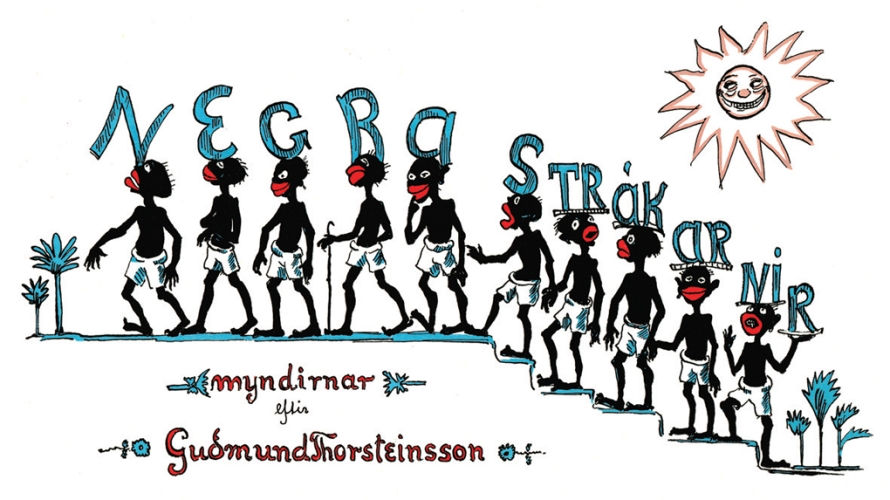|
Ten Little Indians
"Ten Little Indians" is a traditional American children's counting out rhyme. It has a Roud Folk Song Index number of 12976. The term "Indians" in this sense refers to Indigenous North American peoples. In 1868, songwriter Septimus Winner adapted it as a song, then called "Ten Little Injuns", for a minstrel show. Lyrics The modern lyrics for the children's rhyme are: \relative c' \addlyrics Minstrel song Songwriter Septimus Winner created an elaborated version of the children's song, called "Ten Little Injuns", in 1868 for a minstrel show. Derivative songs and books It is generally thought that this song was adapted, possibly by Frank J. Green in 1869, as "Ten Little Niggers", though it is possible that the influence was the other way around, with "Ten Little Niggers" being a close reflection of the text that became "Ten Little Indians". Either way, "Ten Little Niggers" became a standard of the blackface minstrel shows. It was sung by Christy's Minstrels and became ... [...More Info...] [...Related Items...] OR: [Wikipedia] [Google] [Baidu] |
Counting-out Game
A counting-out game or counting-out rhyme is a simple method of 'randomly' selecting a person from a group, often used by children for the purpose of playing another game. It usually requires no materials, and is achieved with spoken words or hand gestures. The historian Henry Carrington Bolton suggested in his 1888 book ''Counting Out Rhymes of Children'' that the custom of counting out originated in the "superstitious practices of divination by lots." Many such methods involve one person pointing at each participant in a circle of players while reciting a rhyme. A new person is pointed at as each word is said. The player who is selected at the conclusion of the rhyme is "it" or "out". In an alternate version, the circle of players may each put two feet in and at the conclusion of the rhyme, that player removes one foot and the rhyme starts over with the next person. In this case, the first player that has both feet removed is "it" or "out". In theory a counting rhyme is determi ... [...More Info...] [...Related Items...] OR: [Wikipedia] [Google] [Baidu] |
And Then There Were None (1945 Film)
''And Then There Were None'' is a 1945 film adaptation of Agatha Christie's 1939 mystery novel of the same name, directed by René Clair. It was released in the United Kingdom as ''Ten Little Indians'', in keeping with the third United Kingdom title of Christie's novel. Plot Eight people, all strangers to each other, are invited to a small isolated island off the coast of Devon, England, by a Mr. and Mrs. Owen. They settle in at a mansion tended by two newly hired servants, Thomas and Ethel Rogers, but their hosts are absent. When the guests sit down to dinner, they notice the centerpiece, ten figurines of Indians. Thomas puts on a gramophone record, through which a man's voice accuses them all of murder: * General Sir John Mandrake, of ordering his wife's lover, a lieutenant under his command, to his death * Emily Brent, of the death of her young nephew * Dr. Edward G. Armstrong, of drunkenness which resulted in a patient dying * Prince Nikita Starloff, of killing a couple while ... [...More Info...] [...Related Items...] OR: [Wikipedia] [Google] [Baidu] |
1868 Songs
Events January–March * January 2 – British Expedition to Abyssinia: Robert Napier leads an expedition to free captive British officials and missionaries. * January 3 – The 15-year-old Mutsuhito, Emperor Meiji of Japan, declares the ''Meiji Restoration'', his own restoration to full power, under the influence of supporters from the Chōshū and Satsuma Domains, and against the supporters of the Tokugawa shogunate, triggering the Boshin War. * January 5 – Paraguayan War: Brazilian Army commander Luís Alves de Lima e Silva, Duke of Caxias enters Asunción, Paraguay's capital. Some days later he declares the war is over. Nevertheless, Francisco Solano López, Paraguay's president, prepares guerrillas to fight in the countryside. * January 7 – The Arkansas constitutional convention meets in Little Rock. * January 9 – Penal transportation from Britain to Australia ends, with arrival of the convict ship ''Hougoumont'' in Western Australia, ... [...More Info...] [...Related Items...] OR: [Wikipedia] [Google] [Baidu] |
Songwriter Unknown
A songwriter is a musician who professionally composes musical compositions or writes lyrics for songs, or both. The writer of the music for a song can be called a composer, although this term tends to be used mainly in the classical music genre and film scoring. A songwriter who mainly writes the lyrics for a song is referred to as a lyricist. The pressure from the music industry to produce popular hits means that song writing is often an activity for which the tasks are distributed between a number of people. For example, a songwriter who excels at writing lyrics might be paired with a songwriter with the task of creating original melodies. Pop songs may be composed by group members from the band or by staff writers – songwriters directly employed by music publishers. Some songwriters serve as their own music publishers, while others have external publishers. The old-style apprenticeship approach to learning how to write songs is being supplemented by university degrees, c ... [...More Info...] [...Related Items...] OR: [Wikipedia] [Google] [Baidu] |
Traditional Children's Songs
A tradition is a belief or behavior (folk custom) passed down within a group or society with symbolic meaning or special significance with origins in the past. A component of cultural expressions and folklore, common examples include holidays or impractical but socially meaningful clothes (like lawyers' wigs or military officers' spurs), but the idea has also been applied to social norms such as greetings. Traditions can persist and evolve for thousands of years—the word ''tradition'' itself derives from the Latin ''tradere'' literally meaning to transmit, to hand over, to give for safekeeping. While it is commonly assumed that traditions have an ancient history, many traditions have been invented on purpose, whether that be political or cultural, over short periods of time. Various academic disciplines also use the word in a variety of ways. The phrase "according to tradition", or "by tradition", usually means that whatever information follows is known only by oral traditio ... [...More Info...] [...Related Items...] OR: [Wikipedia] [Google] [Baidu] |
American Folk Songs
The term American folk music encompasses numerous music genres, variously known as ''traditional music'', ''traditional folk music'', ''contemporary folk music'', ''vernacular music,'' or ''roots music''. Many traditional songs have been sung within the same family or folk group for generations, and sometimes trace back to such origins as the British Isles, Mainland Europe, or Africa. Musician Mike Seeger once famously commented that the definition of American folk music is "...all the music that fits between the cracks." American folk music is a broad category of music including bluegrass, gospel, old time music, jug bands, Appalachian folk, blues, Cajun and Native American music. The music is considered American either because it is native to the United States or because it developed there, out of foreign origins, to such a degree that it struck musicologists as something distinctly new. It is considered "roots music" because it served as the basis of music later develope ... [...More Info...] [...Related Items...] OR: [Wikipedia] [Google] [Baidu] |
American Nursery Rhymes
American(s) may refer to: * American, something of, from, or related to the United States of America, commonly known as the "United States" or "America" ** Americans, citizens and nationals of the United States of America ** American ancestry, people who self-identify their ancestry as "American" ** American English, the set of varieties of the English language native to the United States ** Native Americans in the United States, indigenous peoples of the United States * American, something of, from, or related to the Americas, also known as "America" ** Indigenous peoples of the Americas * American (word), for analysis and history of the meanings in various contexts Organizations * American Airlines, U.S.-based airline headquartered in Fort Worth, Texas * American Athletic Conference, an American college athletic conference * American Recordings (record label), a record label previously known as Def American * American University, in Washington, D.C. Sports teams Soccer * B ... [...More Info...] [...Related Items...] OR: [Wikipedia] [Google] [Baidu] |
Ten Little Indians (Harry Nilsson Song)
"Ten Little Indians" is a song by Harry Nilsson released on his 1967 album ''Pandemonium Shadow Show''. Written in the style of a nursery rhyme, this song is about the Ten Commandments. The Yardbirds' adaptation The Yardbirds recorded "Ten Little Indians" for their second-to-last single on September 25, 1967. The song was a further departure from their earlier recorded material, which had begun when Mickie Most became the group's producer. They follow Nilsson's arrangement, but with Jimmy Page's guitar work, the tune has a more psychedelic- or experimental- rock sound. Only singer Keith Relf and Page perform, with studio musicians John Paul Jones on bass and Clem Cattini on drums (Yardbirds' Chris Dreja and Jim McCarty were left out). Jones also provided the orchestral arrangement and Page employs an audio effect known as reverse echo. In the US, where the Yardbirds still had a strong live performance presence, the song was released as a single with "Drinking Muddy Wat ... [...More Info...] [...Related Items...] OR: [Wikipedia] [Google] [Baidu] |
Ten Green Bottles
"Ten Green Bottles" is a popular children's repetitive song that consists of a single verse of music that is repeated, with each verse decrementing by one the number of bottles on the wall. The first verse is: This pattern continues until the number of bottles reaches zero. The final verse ends "There'll be no green bottles hanging on the wall." Various other versions of the lyrics exist, many of them vulgar or satirical. See also * Repetitive song * "99 Bottles of Beer" * "Ten German Bombers" * "Ten Little Injuns "Ten Little Indians" is a traditional American children's counting out rhyme. It has a Roud Folk Song Index number of 12976. The term "Indians" in this sense refers to Indigenous North American peoples. In 1868, songwriter Septimus Winner ada ..." References English children's songs English folk songs Traditional children's songs British culture Fictional objects Year of song unknown Songwriter unknown Cumulative songs {{Song-stub ... [...More Info...] [...Related Items...] OR: [Wikipedia] [Google] [Baidu] |
The Atlantic Monthly
''The Atlantic'' is an American magazine and multi-platform publisher. It features articles in the fields of politics, foreign affairs, business and the economy, culture and the arts, technology, and science. It was founded in 1857 in Boston, as ''The Atlantic Monthly'', a literary and cultural magazine that published leading writers' commentary on education, the abolition of slavery, and other major political issues of that time. Its founders included Francis H. Underwood and prominent writers Ralph Waldo Emerson, Oliver Wendell Holmes Sr., Henry Wadsworth Longfellow, Harriet Beecher Stowe, and John Greenleaf Whittier. James Russell Lowell was its first editor. In addition, ''The Atlantic Monthly Almanac'' was an annual almanac published for ''Atlantic Monthly'' readers during the 19th and 20th centuries. A change of name was not officially announced when the format first changed from a strict monthly (appearing 12 times a year) to a slightly lower frequency. It was a monthly ... [...More Info...] [...Related Items...] OR: [Wikipedia] [Google] [Baidu] |
Red Herring
A red herring is a figurative expression referring to a logical fallacy in which a clue or piece of information is or is intended to be misleading, or distracting from the actual question. Red herring may also refer to: Animals * Red herring (fish), a type of kipper made from dried, smoked, and salted fish Art, entertainment, and media * ''Red Herring'' (magazine), a former magazine focused on new technology businesses; now a website devoted to same * Red Herring, a character in the cartoon series ''A Pup Named Scooby-Doo'' * ''Red Herring'', a 2012 film starring Holly Valance * ''Red Herring'' (play), a 2000 play by Michael Hollinger * "Red Herring", a trance single by the band Union Jack * Red Herring Artists, an artist's collective based in Brighton, England * Boxer James Red Herring was also known in the ring simply as Red Herring. Business * Red herring prospectus A red herring prospectus, as a first or preliminary prospectus, is a document submitted by a company (issuer) ... [...More Info...] [...Related Items...] OR: [Wikipedia] [Google] [Baidu] |
Court Of Chancery
The Court of Chancery was a court of equity in England and Wales that followed a set of loose rules to avoid a slow pace of change and possible harshness (or "inequity") of the Common law#History, common law. The Chancery had jurisdiction over all matters of equity, including English trusts law, trusts, English property law, land law, the estates of Mental illness, lunatics and the guardianship of infants. Its initial role was somewhat different: as an extension of the lord chancellor's role as Keeper of the King's Conscience, the court was an administrative body primarily concerned with conscientious law. Thus the Court of Chancery had a far greater remit than the common law courts, whose decisions it had the jurisdiction to overrule for much of its existence, and was far more flexible. Until the 19th century, the Court of Chancery could apply a far wider range of remedies than common law courts, such as specific performance and injunctions, and had some power to grant damage ... [...More Info...] [...Related Items...] OR: [Wikipedia] [Google] [Baidu] |








